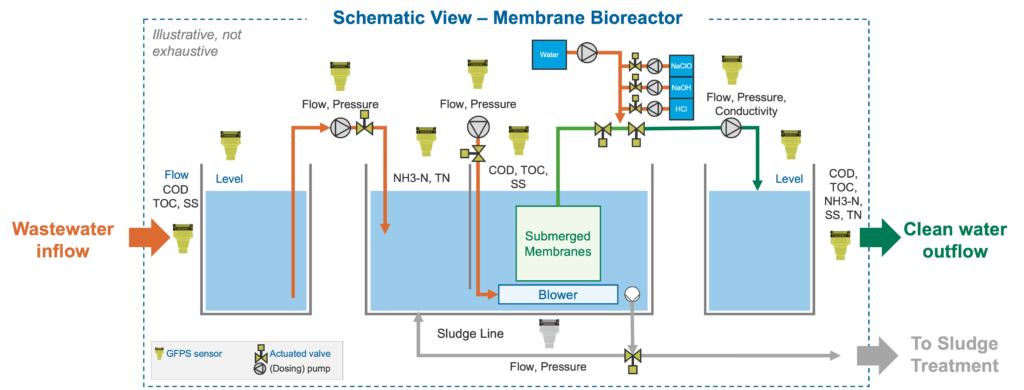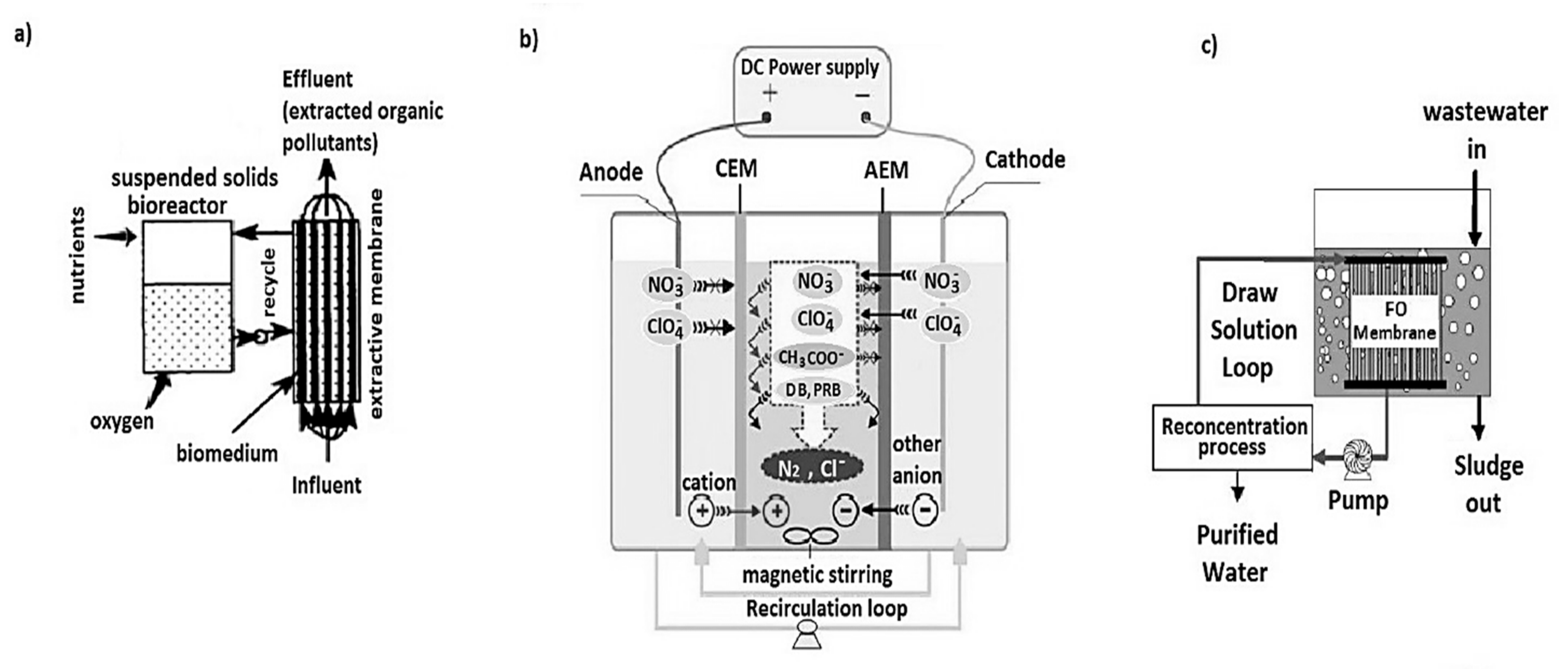How Membrane Bioreactors Are Revolutionizing Water Filtration Systems
The appearance of membrane bioreactors (MBRs) stands for a considerable development in the area of water purification, combining organic treatment procedures with innovative membrane layer filtering modern technologies. This combination not just enhances the top quality of treated effluent however additionally addresses metropolitan room constraints, making MBRs especially suitable for densely booming areas. As worldwide water deficiency magnifies, the function of MBRs in assisting in safe and clean water reuse and sustainable water monitoring becomes increasingly essential. The effects of this technology prolong beyond effectiveness-- what possibilities and difficulties exist ahead for its widespread implementation?
Review of Membrane Layer Bioreactors
Membrane bioreactors (MBRs) represent a significant advancement in water purification innovation, as they integrate biological therapy procedures with membrane filtering. This combination improves the efficiency of wastewater therapy by making use of bacteria to deteriorate organic pollutants while simultaneously using semi-permeable membranes to separate cured water from suspended solids and microorganisms.
The MBR system typically contains a biological activator where the microbial population metabolizes pollutants, followed by a membrane layer filtering unit that preserves biomass and enables just tidy water to go through. This dual performance results in greater effluent quality contrasted to traditional treatment approaches. MBRs can be operated in both set and continuous circulation modes, supplying versatility in design and application.
They likewise make it possible for the recovery of water for reuse, thus adding to water sustainability campaigns. In general, MBRs are at the leading edge of enhancing water therapy performance and high quality, showcasing the possibility for innovative services in environmental administration.
Benefits of MBR Modern Technology
The assimilation of biological treatment with membrane filtration provides various benefits for water filtration procedures. Among the primary advantages of Membrane Bioreactor (MBR) modern technology is its capability to efficiently get rid of both organic and not natural pollutants, bring about high-quality effluent. The membranes act as a physical barrier, preventing put on hold solids and pathogens from passing through, which enhances the overall safety and security and integrity of cured water.
Furthermore, MBR systems need a smaller sized footprint compared to conventional therapy approaches, enabling a lot more effective space utilization. This portable layout is especially beneficial in metropolitan settings where land is restricted. MBRs additionally demonstrate operational adaptability, suiting differing influent high qualities and flow prices without considerable performance destruction.
In addition, the procedure provides enhanced nutrient elimination abilities, particularly for nitrogen and phosphorus, which are essential for protecting against eutrophication in obtaining waters. The decreased sludge manufacturing related to MBR technology additionally equates to lower disposal prices, making it a cost-efficient option in the long run - Membrane Bioreactor. On the whole, the advantages of MBR modern technology setting it as a leading choice for lasting and innovative water filtration systems, addressing both ecological and economic problems
Applications in Water Purification
Applications of Membrane Layer Bioreactor (MBR) technology in water purification are impactful and varied, addressing different therapy needs across numerous industries. MBRs properly combine organic treatment procedures with membrane layer filtration, making them perfect for local wastewater therapy, commercial effluent administration, and also drinkable water reuse campaigns.
In community settings, MBRs are progressively used to enhance the top quality of dealt with wastewater, allowing for compliance with rigorous discharge regulations and assisting in the recycling of water for watering and non-potable usages. Their portable layout additionally makes them appropriate for city settings where room is restricted.
Industrially, MBR modern technology is made use of to deal with process water and wastewater, particularly in industries such as food and beverage, pharmaceuticals, and textiles. By effectively removing pollutants and suspended solids, MBRs assist industries reduce environmental impacts while recovering important resources from wastewater streams.
Moreover, MBRs are obtaining grip in decentralized water therapy applications, where small-scale systems can be deployed in remote locations or creating regions. This versatility enables communities to attain lasting water administration options, improving access to clean water while lowering dependence on standard treatment methods.
Study and Success Stories

In an additional example, a textile production facility in Bangladesh embraced MBR modern technology to resolve its wastewater challenges. The system lowered visit the website chemical oxygen demand (COD) degrees from 1,200 mg/L to less than 100 mg/L, hence satisfying governing requirements and considerably decreasing environmental influence.
The University of Cape Community's MBR installation has actually verified effective in treating greywater for non-potable reuse on university. This project not just conserves drinkable water but additionally serves as an instructional model for sustainable techniques.
Additionally, a fish and shellfish processing plant in Norway made use of MBR technology to treat effluents having high levels of organic issue, achieving over 90% contaminant elimination. These case research studies emphasize MBR technology's flexibility and its essential role in enhancing water top quality across varied applications.
Future of Water Treatment Solutions
As global water scarcity and contamination obstacles heighten, cutting-edge water treatment options are coming to be increasingly necessary to make certain lasting access to tidy water. The future of water therapy exists in the integration of advanced innovations that improve the effectiveness and efficiency of filtration procedures. Membrane layer bioreactors go right here (MBRs) go to the forefront of this evolution, combining biological therapy with membrane filtering to generate high-grade effluent suitable for numerous applications.

Arising patterns such as source healing from wastewater, including nutrients and power, will certainly even more transform therapy centers right into environment-friendly centers. In addition, advancements in nanotechnology and membrane layer materials guarantee enhanced performance and longevity of purification systems.

Conclusion
Their role in drinkable water reuse and lasting see page water management highlights their value in resolving global water shortage obstacles. Proceeded research and growth will even more boost the efficacy and adoption of MBR modern technology, making sure a resilient future for water therapy remedies.
The emergence of membrane bioreactors (MBRs) represents a substantial advancement in the field of water purification, merging biological therapy procedures with cutting-edge membrane filtering innovations. As international water deficiency intensifies, the role of MBRs in helping with drinkable water reuse and lasting water monitoring comes to be significantly critical. They also enable the recovery of water for reuse, thus adding to water sustainability campaigns.As worldwide water deficiency and pollution obstacles intensify, cutting-edge water therapy remedies are coming to be progressively crucial to ensure lasting accessibility to clean water. Their role in potable water reuse and lasting water monitoring highlights their value in attending to worldwide water shortage challenges.
 Elin Nordegren Then & Now!
Elin Nordegren Then & Now! Heather Locklear Then & Now!
Heather Locklear Then & Now! Mary Beth McDonough Then & Now!
Mary Beth McDonough Then & Now! Bill Cosby Then & Now!
Bill Cosby Then & Now! Peter Billingsley Then & Now!
Peter Billingsley Then & Now!